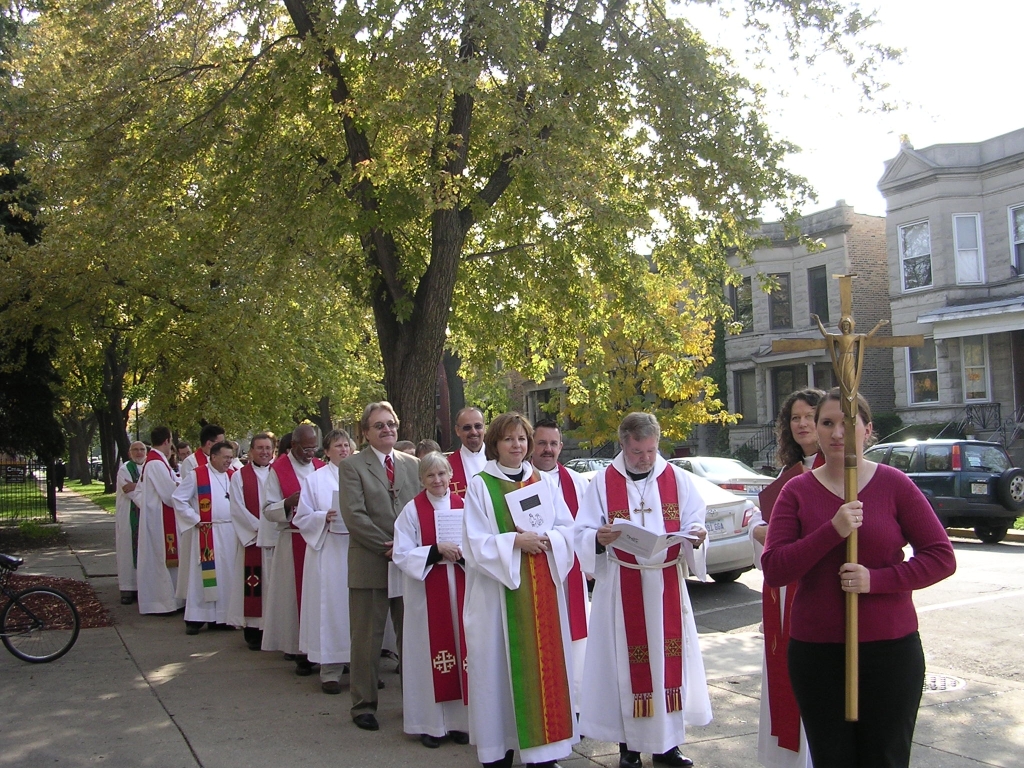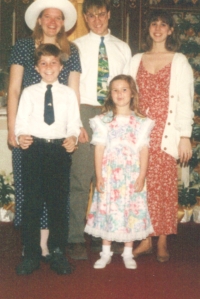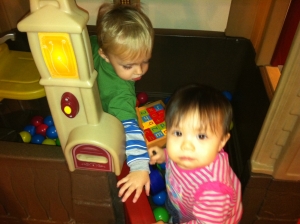Texts: Isaiah 55:1-9 + Psalm 63:1-8 + 1 Corinthians 10:1-13 + Luke 13:1-9
So I have three god-children whom I adore. My eldest goddaughter, Katie, is finishing up her final year of seminary at Vanderbilt in Nashville this spring and was recently approved for ordination by the Disciples of Christ. My middle godson, Gabriel, just got into his parents’ first choice of Montessori pre-schools in Brooklyn, which will begin this coming fall. And my youngest goddaughter, Kai, just celebrated her first birthday here in Chicago two weeks ago.

I adore all three of my godchildren, and my only regret is that I don’t somehow live close enough to all of them to get to see them as frequently as I do Kai, who Kerry and I get to babysit once a month in Oak Park while her moms lead the youth group at their church. You heard me right, we babysit their infant daughter so that they can spend time with other people’s children. That the kind of fantastic parents these two moms are.
If you’re thinking I look too young to have a goddaughter old enough to be graduating from seminary, thank you. I do look great, don’t I? I wish I could chalk it all up to the godly life, but I know myself (and some of you know me) better than that. The fact of the matter is that I became a godfather at a very early age. I think I was a freshman in high school. Katie’s mother, LaDonna, had been my fifth grade Sunday School teacher and, like our own Sunday School teachers here at St. Luke’s, she took the job seriously. She was prepared for us each week. She entertained us. She disciplined us. She got to know us and she loved us. LaDonna was among the first in the church who showed us what it means that, in baptism, we are reborn children of God and made members of the body of Christ.

When her second child, Katie, was born, LaDonna asked three of us from that fifth grade Sunday School class to be her godparents, me and my two best friends, Erika and Laurie. We were honored, and a little daunted. What did it mean for us to be godparents at so young an age? Would we be expected to take care of Katie if something happened to her parents? What kind of a responsibility was this?
Different cultures have different expectations around what a godparent is, and different families have different traditions around who gets asked to be a godparent. I’d like us to look for just a few minutes at what parents and godparents actually commit to during a baptism. So, once again, I’m going to ask you to open the ELW, the red hymnal, in the back of the pew in front of you. If you’ll turn to page 228 you’ll find the questions that are asked of parents and sponsors when children who are not able to answer for themselves are brought for baptism.
When parents bring their children for baptism, this is what the church asks of them:
As you bring your children to receive the gift of baptism, you are entrusted with responsibilities:
to live with them among God’s faithful people,
to bring them to the word of God and the holy supper,
teach them the Lord’s Prayer, the Creed, and the Ten Commandments,
place in their hands the holy scriptures,
and nurture them in faith and prayer,
so that your children may learn to trust God,
proclaim Christ through word and deed,
care for others and the world God made,
and work for justice and peace.
We ask parents to promise that they will do these things, and we ask sponsors (the church’s name for godparents and any others who commit to caring for a baptized person) to “nurture these children in the Christian faith” and to “help them live in the covenant of baptism.” Then, beyond even the parents and godparents, we ask the entire congregation, who act as the local representatives of the whole Christian church to promise to support these children and to pray for them in their new life in Christ.
In other words, we invite the church to meddle in their lives.
I think we have to remember that — that for most of us in this room promises have been made, very likely before we can even remember, by members of this and other congregations, by our parents and their friends, by church mothers and fathers, by Sunday School teachers, to meddle in our lives — before we can read this morning’s scriptures. We have to remember that we have been claimed in love, by love, for love, before we can read the word this morning’s scriptures all speak.
Because that word is repent.
A group of people come to Jesus with questions about a terrible thing that has happened. A group of Galileans had been killed by Herod, the local ruler beholden to the Roman empire. The blood of the slaughtered had been mixed with that of their temple sacrifices. What did this mean? Why had this happened to these people? What had they done to deserve this?
This is a totally natural question, it’s one we’re still asking. Ours is a world in which blood is spilled every day, and we tell ourselves stories about those who have died in an attempt to manage the horror of that reality so that we can move on with our lives. Derrion Albert was beaten to death walking home from school on the South side in 2009. Why did this happen to him? What had he done to deserve this? Janay McFarlane was shot just hours after President Obama gave a speech condemning gun violence in Hyde Park last month. Why did this happen to her? What had she done to deserve this?
Jesus asks the crowd, “do you think that because these people suffered in this way they were worse sinners than all other people?”
It’s a good question. Do we think these things only happen to people who, somehow, deserve it? Worse, do we think these things happen because people deserve it? The quick answer is, no, of course not. But that answer comes too easily. It’s the one we know we’re supposed to give.
If we stay with the question for a while, other questions and other answers begin to emerge. If we don’t think violence is an acceptable form of judgement on a life, then why do we tolerate its use as a punishment by the courts? Why do we allow solitary confinement, a form of psychological torture, to be used by our penal system? Why do we fetishize or valorize the use of torture in films from Reservoir Dogs to Zero Dark Thirty?
If we don’t think violence is an acceptable judgement on a life, then why do we abandon communities, neighborhoods, and nations to the ravages of prolonged violence — whether that be the in the form of children bullied every day for a decade because of a physical or developmental disability; or neighborhoods left to languish without quality education or adequate opportunities for employment; or nations living under the constant scrutiny of drones flying overhead that might rain death at any moment.
We have come up with all sorts of perverted theologies and crass politics to explain away our use of violence against one another. They deserve it because they’re poor. They deserve it because they’re Arab. They deserve it because they’re queer. They deserve it because they’re Black. They deserve it because they’re immigrants. They deserve it because they’re different. They deserve it because they’re not us.
It’s rarely said out loud, these blunt denials of our shared humanity, but if they aren’t on some level what we believe about the people in this world who disproportionately suffer violence at the hands of the powerful, then why do we suppose it happens?
Jesus says, “do you think that because these people suffered in this way they were worse sinners than all other people? No, I tell you; but unless you repent, you will all perish as they did.”
There’s a quote I used to see on posters and in print all the time by the German Lutheran pastor, Martin Niemöller, on the dangers of political apathy. Reflecting back on the abuses suffered in Nazi Germany, he said,
First they came for the communists, and I didn’t speak out because I wasn’t a communist.
Then they came for the socialists, and I didn’t speak out because I wasn’t a socialist.
Then they came for the trade unionists, and I didn’t speak out because I wasn’t a trade unionist.
Then they came for the Jews, and I didn’t speak out because I wasn’t a Jew.
Then they came for the Catholics, and I didn’t speak out because I wasn’t a Catholic.
Then they came for me, and there was no one left for me.
I think this Lutheran pastor was trying to teach us something about the meaning of the word “repent” and its relationship to baptism. As long as we respond to the suffering of others with questions and assumptions about what they’ve done to deserve their treatment, we will let ourselves off the hook when it comes to doing anything about it. We’ll find excuses to stay out of the struggle.
“Oh, but I’m not in a union.”
“Well, my family immigrated legally.”
“If you’d seen the way he was dressed, he was asking for it.”
Then the moment comes when it is you who has been targeted for violence, whether that be the economic violence of a war on not only the middle class, but the working class, the working poor and the majority of the world outside of industrialized nations like ours; or the violence of laws that deny you access to the same civil rights taken for granted by your neighbors; or the violence of a spouse or lover who lays hands on you in order to maintain power and control.
And in that moment, who will stand up for you?
We made promises to each other when we were each baptized. Promises to care for each other and the world God made. Promises to work for justice and peace. Baptismal promises. We promised to meddle in each others’ lives for the sake of good. We promised we would not abandon each other to the violences of this world.
And we have broken our promises, which is why Jesus calls us to repent.
It’s hard to preach repentance, because it sounds like condemnation, and who am I — who are any of us — to offer up condemnation? Didn’t Jesus also say, “let he who is without sin cast the first stone?”
But we’re not talking about casting stones, which is just another form of violence. We’re talking about telling the truth, even when it’s messy, even when it’s dangerous. And we’re talking about telling the truth in love — not to score points or win arguments, but in order to care for one another and the world God made. In order to keep the promises we made, and were made over each of us.

I love my three godchildren, and I made promises to help them live into the promises of baptism. Whether they are near to me, or far away, I take those promises seriously. I meddle in their lives, and I will continue to do so because I understand that to be a part of my job as a Christian, as a member of the household of faith.
It is your job too. The work of prophets is not reserved for a few, but for all the baptized people of God. It is not limited to a committee of the church, called Social Justice — it is work that belongs to each of us. We are called as Christians to make a public witness to the world that each of us is a precious child of God. That each of us is loved and cherished and necessary in God’s economy. That none of us are expendable. If we cannot do that for one another, if we cannot do that for the weakest and most vulnerable among us, apart from us, even far from us, then we will all perish just as they already are.
Remember your baptism and repent.
Amen.